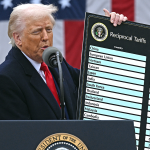
French Prime Minister Sebastien Lecornu resigned on Monday, less than 24 hours after unveiling a new cabinet that was immediately met with criticism from both opposition and coalition members.
The move plunges President Emmanuel Macron’s government into fresh political turmoil and adds to growing investor unease over France’s fiscal outlook.
Lecornu, 39, was appointed in early September as France’s fifth prime minister in less than two years.
His brief tenure ends amid widespread dissatisfaction over stalled economic reforms, fractious parliamentary politics, and an inability to pass the 2026 budget — a key test of his government’s viability.
Political crisis deepens
Lecornu’s resignation came only hours after the new cabinet he named on Sunday was due to hold its first meeting.
The lineup was nearly identical to that of his predecessor, François Bayrou, who was ousted in early September after failing to secure parliamentary backing for austerity measures.
The lack of new faces in Lecornu’s government immediately drew criticism from across the political spectrum.
Members of several coalition parties voiced frustration that the cabinet represented continuity rather than renewal, despite Macron’s pledge to restore stability.
Opposition leaders accused the president of political “tone-deafness” and warned that the government was losing legitimacy.
A fragile mandate and fractious parliament
Macron appointed Lecornu — a former defence minister and longtime ally — in a bid to restore control after a turbulent summer.
Snap elections called by Macron last year backfired, producing a deeply divided Parliament split among centrist, left-wing, and far-right blocs.
That fragmentation has left the government unable to pass key fiscal legislation, forcing successive prime ministers from office.
Lecornu’s two predecessors, Bayrou and Michel Barnier, both fell over the contentious 2026 budget.
Analysts had viewed Lecornu’s appointment as Macron’s attempt to consolidate loyalty rather than seek cross-party compromise.
Over the past month, Lecornu held multiple rounds of talks with centrist allies and opposition figures in hopes of securing a parliamentary “non-aggression pact” to advance the budget efforts that failed to yield results.
Markets react to renewed instability
Financial markets responded swiftly to the latest political shock.
French government bond yields rose, with the benchmark 10-year note climbing nine basis points to 3.6%.
The spread between French and German 10-year bonds — a key measure of perceived fiscal risk — widened to over 89 basis points, the highest level since late 2024.
Analysts warned that prolonged instability could weigh on investor confidence at a critical moment for France, as it faces mounting pressure to curb spending and bring its deficit within European Union limits.
With Lecornu’s departure, Macron faces the difficult task of appointing yet another prime minister capable of commanding enough parliamentary support to push through a budget and stabilise the government — a challenge that has eluded him repeatedly.
The post French Prime Minister Sebastien Lecornu resigns hours after naming cabinet appeared first on Invezz






